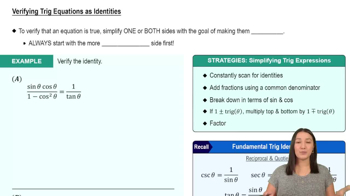Definite integrals Evaluate the following integrals using the Fundamental Theorem of Calculus
∫¹₁/₂ (t⁻³ ― 8) dt
 Verified step by step guidance
Verified step by step guidance Verified video answer for a similar problem:
Verified video answer for a similar problem:



 6:11m
6:11mMaster Fundamental Theorem of Calculus Part 1 with a bite sized video explanation from Patrick
Start learning